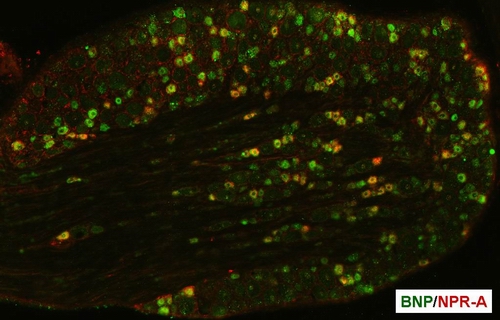Time:2010-08-12
On August 11, 2010, a research article from the Institute of Neuroscience entitled "Inhibition of inflammatory pain by activating B-type natriuretic peptide signal pathway in nociceptive sensory neurons" was published in the Journal of Neuroscience. This work has been carried out by Ph.D. student Fang-Xiong Zhang and collaborators under the supervision of Dr. Xu Zhang.
Nociceptive sensory neurons in the dorsal root ganglion (DRG) are first order neurons in the pain pathway. Noxious stimulations cause release of excitatory neurotransmitters, such as glutamate, from the afferent terminals to transmit nociceptive signals to the spinal cord and the brain. Dr. Zhanga€?s group first found that the expression of BNP and its receptor NPR-A in small DRG neurons are markedly increased following peripheral tissue inflammation. They further found that BNP inhibits the excitability of nociceptive sensory neurons in the presence of glutamate, and reduces inflammatory pain through activation of the NPR-A/PKG/BKCa channel pathway. These results suggest that selective activation of NPR-A-mediated signal pathway in nociceptive afferent neurons with appropriate agonists could be a potential strategy for pain therapy.
This work is supported by the grants from the Chinese Academy of Sciences, the Ministry of Science and Technology and the National Natural Science Foundation of China.

Expression of B-type natriuretic peptide and its receptor in noticeptive sensory neurons
 附件下载:
附件下载: